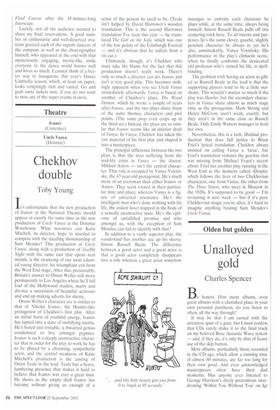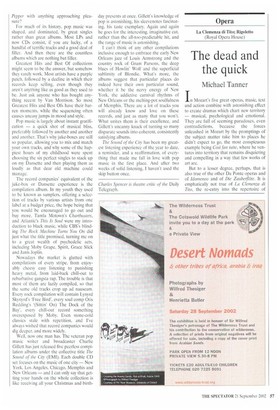Unalloyed gold
Charles Spencer
B, honest. How many albums, even great albums with a cherished place in your own personal pantheon, do you listen to often, all the way through?
It may be that I am cursed with the attention span of a gnat, but I must confess that CDs rarely make it to the final track on my beloved Bose Acoustic Wave system — and, if they do, it's only by dint of heavy use of the skip button.
Most albums, particularly those recorded in the CD age, which allow a running time of almost 80 minutes, are far too long for their own good. And even acknowledged masterpieces often have their dud moments. Has anyone ever listened to George Harrison's direly pretentious sitardroning 'Within You Without You' on Sgt Pepper with anything approaching pleasure?
For much of its history, pop music was shaped, and dominated, by great singles rather than great albums. Most LPs and now CDs consist, if you are lucky, of a handful of terrific tracks and a good deal of filler. And then there are the countless albums which are nothing but filler.
Greatest Hits and Best Of collections might seem to be the answer, but somehow they rarely work, Most artists have a purple patch, followed by a decline in which their records keep selling, even though they aren't anything like as good as they used to be. Just ask anyone who has bought anything recent by Van Morrison. So most Greatest Hits and Best Ofs have their barren moments, while the sequencing often causes uneasy jumps in mood and style.
Pop music is largely about instant gratification — a quick shot of musical bliss, preferably followed by another and another and another. That's why juke-boxes are still so popular, allowing you to mix and match your own tracks, and why some of the happiest hours of my childhood were spent choosing the six perfect singles to stack up on my Dansette and then playing them as loudly as that dear old machine could manage.
The record companies' equivalent of the juke-box or Dansette experience is the compilation album, In my youth they used to be known as samplers, offering a selection of tracks by various artists from one label at a budget price, the hope being that you would be encouraged to go out and buy more. Tamla Motown's Chartbusters, and Atlantic's This Is Soul were my introduction to black music, while CBS's blinding The Rock Machine Turns You On did just what the title promised, turning me on to a great wealth of psychedelic acts, including Moby Grape, Spirit, Grace Slick and Janis Joplin.
Nowadays the market is glutted with compilations of every stripe, from enjoyably cheesy easy listening to punishing heavy metal, from laid-back chill-out to rebarbative gangsta rap. The trouble is that most of them are lazily compiled, so that the same old tracks crop up ad nauseam. Every rock compilation will contain Lynyrd Skynyrd's 'Free Bird', every soul comp Otis Redding's (Sittin' On) The Dock of the Bay', every chill-out record something overexposed by Moby. Even stone-cold classics stale with repetition, and I've always wished that record companies would dig deeper, and more widely.
Well, now one man has. The veteran pop music writer and broadcaster Charlie Gillett has just released five peerless compilation albums under the collective title The Sound of the City (EMI). Each double CD set focuses on the music of one city — New York, Los Angeles, Chicago, Memphis and New Orleans — and I can only say that getting your hands on the whole collection is like receiving all your Christmas and birth
day presents at once. Gillett's knowledge of pop is astonishing, his sieevenotes fascinating, his taste exemplary. Again and again he goes for the interesting, imaginative cut, rather than the all-too-predictable hit, and the range of music is astonishing.
I can't think of any other compilations inclusive enough to embrace the early New Orleans jazz of Louis Armstrong and the country rock of Gram Parsons, the deep blues of Howlin' Wolf and the superficial sublimity of Blondie. What's more, the albums suggest that particular places do indeed have their own particular sound, whether it be the nervy energy of New York, the addictive carnival rhythms of New Orleans or the melting-pot soulfulness of Memphis. There are a lot of tracks you will already know and love on these records, and just as many that you won't. What unites them is their excellence, and Gillett's uncanny knack of turning so many disparate sounds into coherent, consistently satisfying albums.
The Sound of the City has been my greatest listening experience of the year to date, a reminder, and a reaffirmation, of everything that made me fall in love with pop music in the first place. And after two weeks of solid listening, I haven't used the skip button once.
Charles Spencer is theatre critic of the Daily Telegraph.











































































 Previous page
Previous page